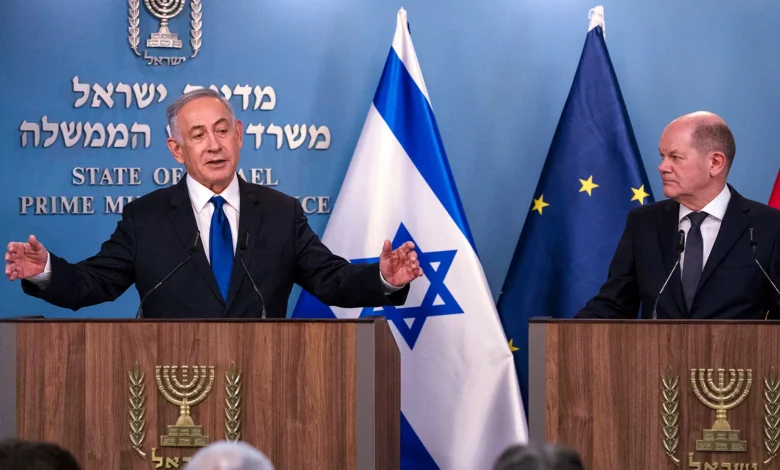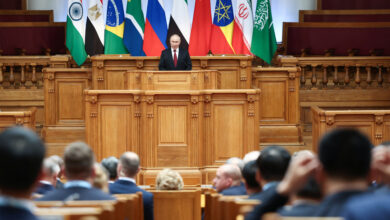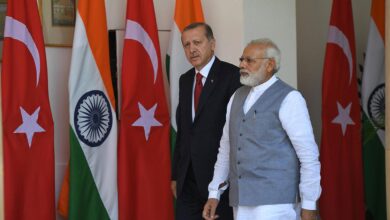How Germany damaged its relations with the Islamic world.

As a response to the 9/11 attacks in the United States and the hostility those heinous acts had stirred in the West toward Muslims, in March 2003, the German Foreign Office created an online platform called Qantara-meaning “bridge” in classical Arabic. The declared purpose of the independent portal, run by German public broadcaster Deutsche Welle, was to “bridge” cultural differences between the West and the Islamic world and offer a neutral platform for interreligious dialogue.
The portal site that publishes content in English, German, and Arabic- operated successfully for more than 20 years with seemingly no editorial guidance from the German government until it started publishing content critical of German debates on anti-Semitism in the context of the Gaza genocide.
Early this year, a press release announced the restructuring of Qantara and the transfer of its management from Deutsche Welle to the Institute for Foreign Cultural Relations—IFA (Institut für Auslandsbeziehungen), which is affiliated with and funded by the Federal Foreign Office.
The ministry described the move as “purely” structural and unrelated to the site’s editorial direction and output. But in an interview, German Foreign Minister Annalena Baerbock suggested there were indeed concerns about Qantara’s content, particularly on anti-Semitism, which factored into the decision.
Within days after the announcement, no less than 35 members of Qantara’s editorial staff sent an open letter addressed to Baerbock: “We very much doubt that the IFA has the editorial capacities that such a complex project, painstakingly built up over many years, needs to continue successfully and remain a beacon for all those interested in the relationship of the Middle East and Europe.” The letter did not change things, and all editors resigned in protest.
On July 1, the management of Qantara – which had, by that time, lost all its editorial employees – was transferred from Deutsche Welle to IFA. “Until the new editor-in-chief, Jannis Hagmann, appoints a new editorial board and takes up work in the coming weeks, the portal will remain under the editorial control of the IFA,” declared this entity.
What makes the transitional phase at Qantara unique is that it allows one to observe and assess actual views of the German government about the Middle East and its peoples since it places state officials as open editors of a platform advertised as Germany’s “bridge” to the Islamic world.
Qantara had been respected for its objective, informative, in-depth reporting and analysis of the Middle East and the wider Islamic world, both in Germany and the region itself, until the change in management.
It is not so any longer. Today, under the tutelage of the IFA associated with the German Foreign Office, Qantara appears not to work in the direction of opening up intercultural and interfaith debate and conversation but rather to reinforce biases and prejudices the German government has adopted about Muslims in general and Palestinians in particular through ill-researched and -edited opinion pieces.
Perhaps the best example of Qantara’s new editorial stance—and by extension, the German government’s actual views of the Middle East and its peoples— was an opinion article published on July 25 entitled “Crisis Communication and the Middle East: Like and Share.”
The piece, an apparent analysis of the media reporting on the Israeli war on Gaza, is written by Moroccan-German author Sineb El Masrar. It posits Palestinians as inherently violent and anti-Semitic people, lying about their suffering, their history, their culture, and their political motivations to besmirch Israel and undermine Western democracies.
It does so in a highly authoritative manner, with no evidence or anything resembling a supportive argument, offering incontestable proof that the Palestinian journalists reporting on genocide are all Hamas operatives in disguise, that pictures of death and suffering in Gaza are “staged,” that it is hatred of Zionist occupiers on their land due to “Islamic anti-Semitism,” and no there is no actual famine in Gaza. The international media will not show you images of “full market stalls and barbecue stations” in the Strip.
Whatever the future might bring, this transition phase in Qantara and El Masrar’s piece already taught us a great deal about the German government and its approach to the Middle East: they showed us that the German government views Israel as a righteous, moral entity while committing genocide, and the Muslims as anti-Semitic, superficial but manipulative hordes hell-bent on destabilizing Western democracies.




